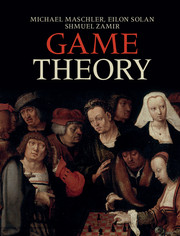Book contents
- Frontmatter
- Contents
- Acknowledgments
- Notations
- Introduction
- 1 The game of chess
- 2 Utility theory
- 3 Extensive-form games
- 4 Strategic-form games
- 5 Mixed strategies
- 6 Behavior strategies and Kuhn's Theorem
- 7 Equilibrium refinements
- 8 Correlated equilibria
- 9 Games with incomplete information and common priors
- 10 Games with incomplete information: the general model
- 11 The universal belief space
- 12 Auctions
- 13 Repeated games
- 14 Repeated games with vector payoffs
- 15 Bargaining games
- 16 Coalitional games with transferable utility
- 17 The core
- 18 The Shapley value
- 19 The bargaining set
- 20 The nucleolus
- 21 Social choice
- 22 Stable matching
- 23 Appendices
- References
- Index
2 - Utility theory
- Frontmatter
- Contents
- Acknowledgments
- Notations
- Introduction
- 1 The game of chess
- 2 Utility theory
- 3 Extensive-form games
- 4 Strategic-form games
- 5 Mixed strategies
- 6 Behavior strategies and Kuhn's Theorem
- 7 Equilibrium refinements
- 8 Correlated equilibria
- 9 Games with incomplete information and common priors
- 10 Games with incomplete information: the general model
- 11 The universal belief space
- 12 Auctions
- 13 Repeated games
- 14 Repeated games with vector payoffs
- 15 Bargaining games
- 16 Coalitional games with transferable utility
- 17 The core
- 18 The Shapley value
- 19 The bargaining set
- 20 The nucleolus
- 21 Social choice
- 22 Stable matching
- 23 Appendices
- References
- Index
Summary
Chapter summary
The objective of this chapter is to provide a quantitative representation of players' preference relations over the possible outcomes of the game, by what is called a utility function. This is a fundamental element of game theory, economic theory, and decision theory in general, since it facilitates the application of mathematical tools in analyzing game situations whose outcomes may vary in their nature, and often be uncertain.
The utility function representation of preference relations over uncertain outcomes was developed and named after John von Neumann and Oskar Morgenstern. The main feature of the von Neumann–Morgenstern utility is that it is linear in the probabilities of the outcomes. This implies that a player evaluates an uncertain outcome by its expected utility.
We present some properties (also known as axioms) that players' preference relations can satisfy. We then prove that any preference relation having these properties can be represented by a von Neumann–Morgenstern utility and that this representation is determined up to a positive affine transformation. Finally we note how a player's attitude toward risk is expressed in his von Neumann–Morgenstern utility function.
Preference relations and their representation
A game is a mathematical model of a situation of interactive decision making, in which every decision maker (or player) strives to attain his “best possible” outcome, knowing that each of the other players is striving to do the same thing.
- Type
- Chapter
- Information
- Game Theory , pp. 9 - 38Publisher: Cambridge University PressPrint publication year: 2013



